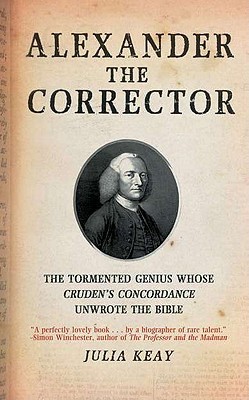
It's much more than a biography of a book. Cruden is known to have been held in a mental asylum at least three (possibly four) times in his life. Keay uses these events as the guidepoints for much of the book, interpreting much of Cruden's life as an attempt to prove his own sanity beyond doubt. I'm not completely convinced by this as an interpretive approach. History-writing can be the art of extracting narrative from the details of the past [1], but I think Keay gives her subject's life more direction than is completely plausible. On the other hand, it lets her convert an otherwise potentially dry subject into a gripping tale of struggle, treachery, and people making choices. On balance I think Keay's choice of approach is justified. Sometimes it's better to have a historian's scrupulousness give way to the talents of the writer and the needs of a publisher.
One interesting possibility is whether Cruden ever considered emigrating to the new world, where his particular religious intensity might have been better appreciated [2] (it's possible that it would have been scandalised too). Keay makes no reference to it, so we can assume that if Cruden considered migrating he didn't consider it for long. The other question I ask myself is what he would have made of Christianity today. We can infer that he would have still regarded Catholicism and Orthodoxy as incomprehensibly flawed. Depressingly, he may well have sympathised with the crude venom of a Jack Chick. On the other hand, we can be sure that he would have been enchanted by the power of modern technology to organize and make accessible the world's information. Perhaps that too would have allowed him to imagine and see a world of ideas and knowledge more complex and multidimensional than he could ever have imagined in his own era [3]. Cruden was a straightforward man, but Keay has certainly proved that he was also a man of great vision.
==================================
[1] Hayden White, 'The Question of Narrative in Contemporary Historical Theory', History and Theory 23 (1984) 1-33, pp.19-21.
[2] Larry Schweikart and Michael Allen, A Patriot's History of the United States (Sentinel: New York, 2007), pp.43-44
[3] Consider Christopher White, 'Seeing Things: Science, the Fourth Dimension, and Modern Enchantment', American Historical Review 119 (2014) 1466-1491.
No comments:
Post a Comment